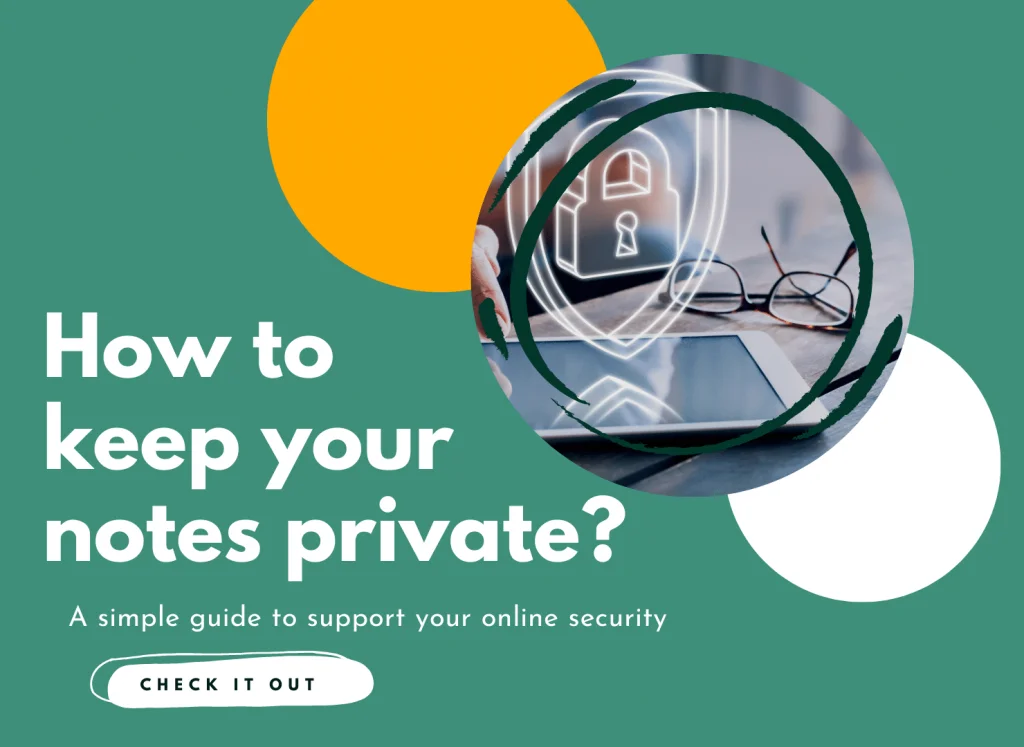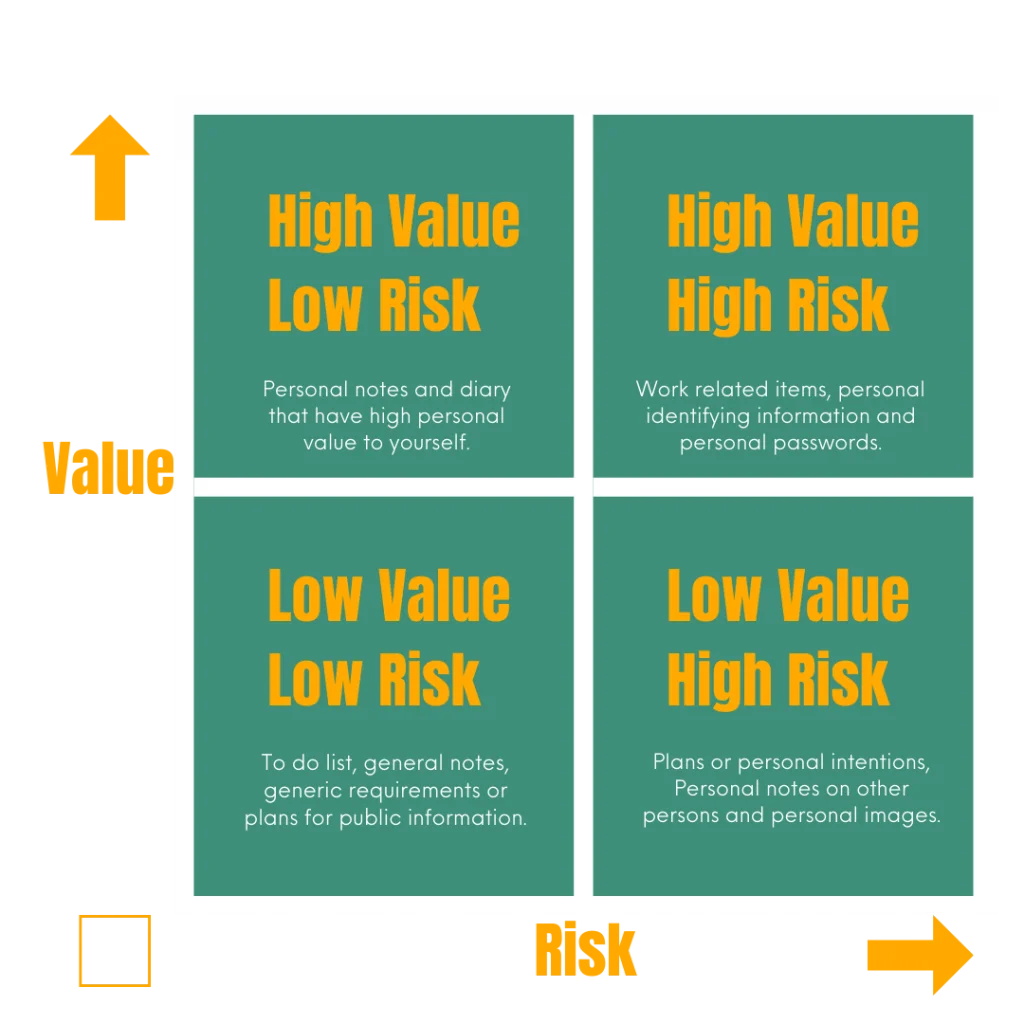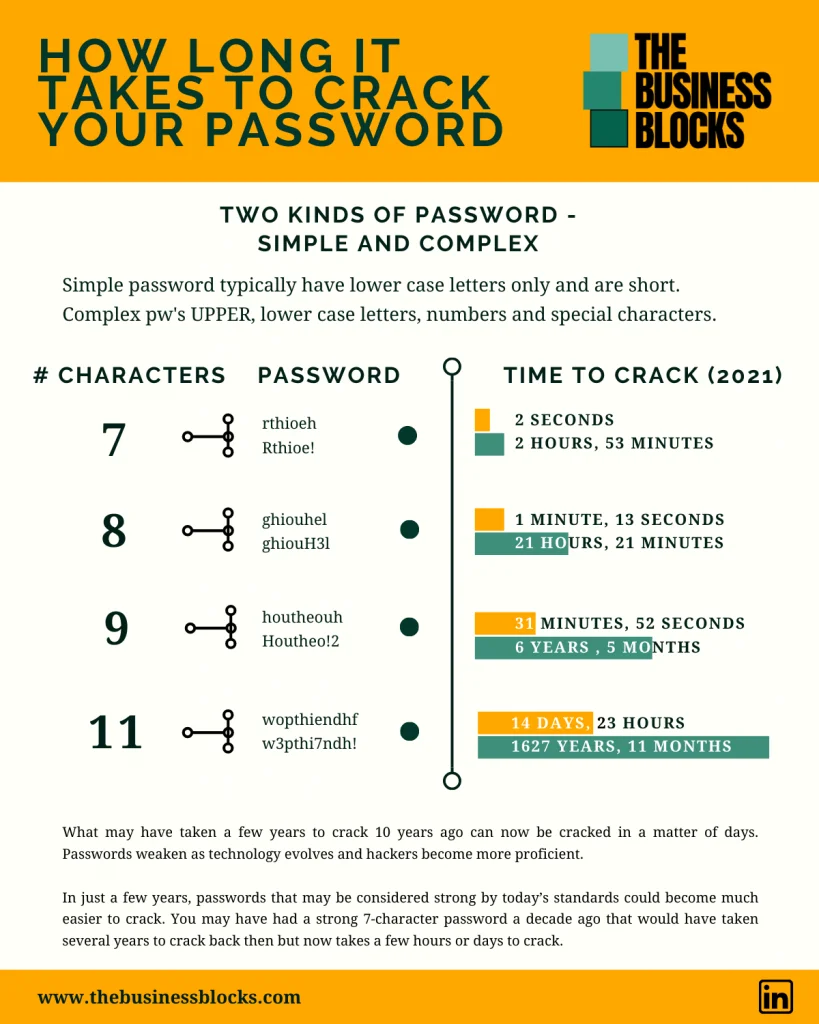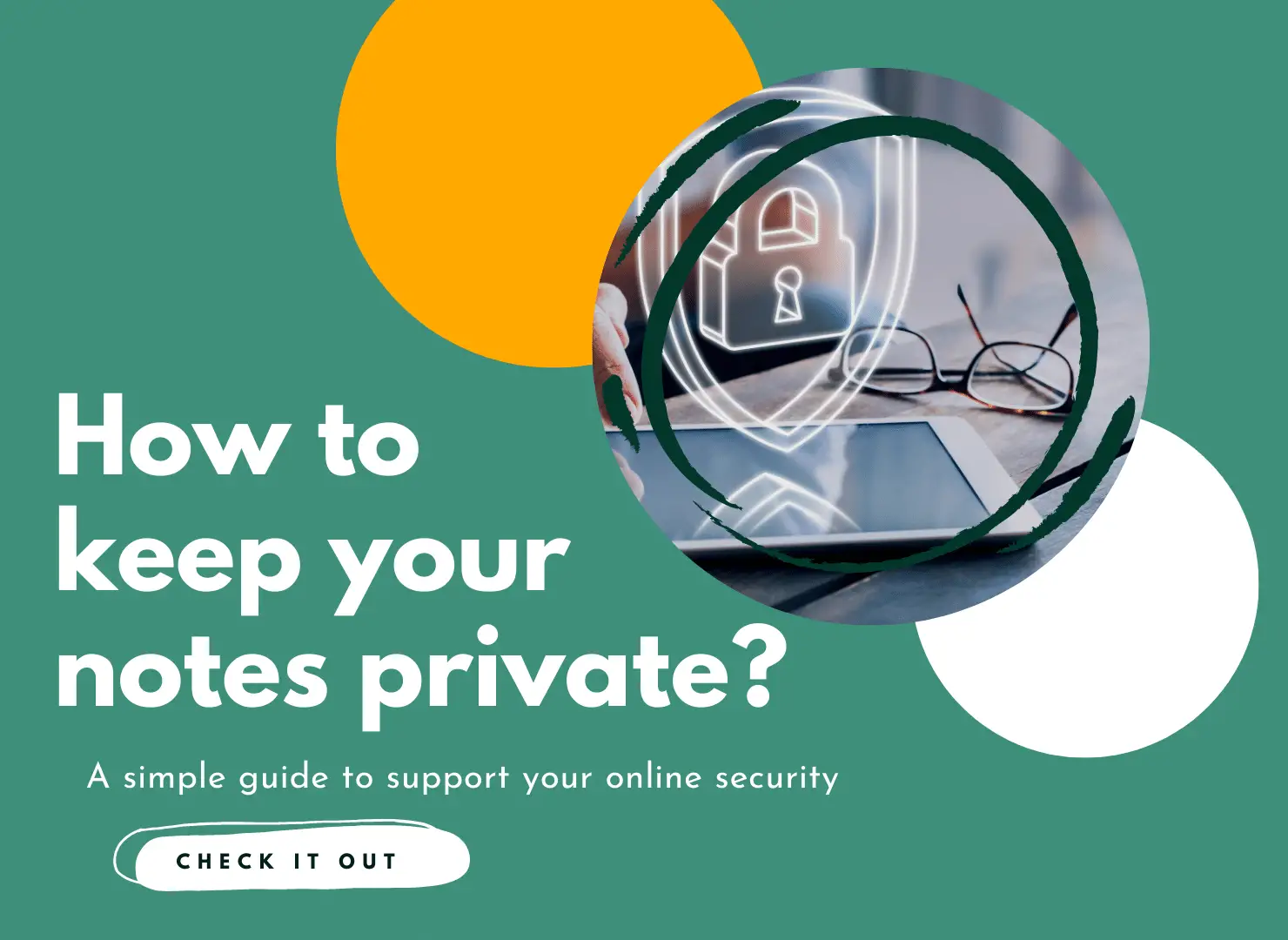A quick guide to keep your notes secure online.
With everyone working from home now, there is obviously less risk for keeping your notes private.
If you use the traditional method of keeping your handwritten notebooks on your desk, there will be no peeping toms at home except for maybe the kids looking for a colouring book.
But if you are using any online note-taking tool it is important to understand how to keep your notes private.

Table of contents
“Online apps are only as secure as you treat them”
TBB 2021
There are many different apps out there to keep you notes stored and they can be either on your phone on an app or you can keep them online, accessible via your laptop or desktop computer.
To answer the question, how do I keep notes private? To keep your notes private online you need to ensure the app that you are using is encrypted, the software is up to date (per the software platforms specifications) and that your password is unique and takes use of all the different types of characters on your keyboard.
Do not share password with friends/family or link out to your notes directly nor access the notes from devices that you are not familiar with.
In this article we will answer the questions:
- Practical risk vs value review of your notes
- Are my notes worth securing?
- How personal are the notes?
- Are the notes for work or work related?
- Am I storing other people’s information?
- Four things to do to keep your notes private?
- Encryption – Why encryption is important for privacy.
- Five simple security and privacy considerations for the end user.
- Password validity and protection.
- Enable two factor authentication.
- Are you notes secure online or offline?
- Cloud hosted, local desktop or offline device.
- Summary: What is the best way to keep your notes private online?
Are you looking for a way to keep your notes private?
Whether you’re taking personal or professional notes, the last thing you want is prying eyes to see them. That’s why it’s important to find a secure online platform where you can store all of your data privately and securely.
Most cloud-based service uses advanced encryption technology to make sure that no one but you can access your information. they also use sophisticated algorithms to ensure customer privacy and safety. With this platform, rest assured that all of your notes will be kept secret from anyone who isn’t authorized to view them.
Are your notes worth securing?
1. Are my notes worth securing?
A subjective question but important none the less. You should recognise the purpose of the notes and consider how much effort you would like to engage to keep them secure and private.
The time you take to manage and keep the notes secure is important as you compare the value of for example, a personal diary vs to-do list vs company financial data.
We have created a simple matrix that will give you an understanding and opportunity to assess the risk vs value of the information you want to keep secure.
Four things to consider from a risk vs value perspective:
- Are the notes personal in nature where you may be embarrassed or lose credibility if your files were to be released and open public knowledge? We place this field in the high value, low risk. The items have high personal value but generally low risk from an exposure point and who owns the information is important to consider when considering how much effort to put into storing you notes.
- You should review your employment contract (or a lawyer) but typically any data or information that you manage for work is owned by the company and you could be in breach of their policy and subject to loss. We place all company information in the high risk high value spot and you should take caution to manage the notes and data accordingly.
- The bottom right of the the low value, high risk quadrant. Examples may be someone else’s personal information or images that you have in your possession. The high risk nature is that you cannot control what can happen if that person is not accepting of the information going public or being shared.
- Finally, all other generic notes and/or to do lists that bear a low risk and low value are fine to not require a secure environment.

Four things to ensure your notes are protected and private.
1. What is data encryption and why is it important?
If you haven’t heard of encryption that is ok. Basically when you browse online you are requesting and sending data in real time and when this data is in transit, for example, making a google search. You are sending a message to google to go find information for you , they are replying with the search results and then you click through and read the information.
This may include putting in your email address and password to log into an account or in this case for storing your notes online, you are typing your notes into a browser and these are then stored on the other company’s server typically in a physical locations in a country.
Most of what you do online is encrypted, Norton Antivirus describes encryption as “the process that scrambles readable text so it can only be read by the person who has the secret code, or decryption key. It helps provide data security for sensitive information.”
Effectively, the data is stored in a scrambled format on your device and you need a key or passcode to unlock and unscramble the data. When you log into your device or app, this is the authentication to unlock and unscramble the data,
If you are using an iOS or Android Device – Check how to review your encryption on that device here.
2. Five simple security and privacy considerations for the end user.
You can use these five points as a quick guide to securing your notes:
- Ensure your apps are always updated and have the latest version.
- Check for SSL on the main website – What is SSL?
- Compliance to GDRP or associated country requirements – Here
- Location of servers, country and host – Keep as local as possible.
- Cloud online vs offline – Check out the comparison here.
3. Ensure your password is strong and unique
Stating the obvious here but you review the data below, we analysed each of the following passwords and the times an algorithm can take to crack in 2021.
Password strength weakens over time due to the computing power available to hackers and what were originally strong passwords in the past can now be broken quite easily.
Not only are your passwords important but also where and how you store them as well. You can check out some hacking statistics here.

4. Two factor authentication to secure your access
A common form of authorisation is called 2FA or two factor authentication. The use of this security method has become popular due to the prevalence and common access points for all software platforms.
Method 1 for 2FA – Direct to Mobile Number or Authenticator
Are you notes secure online or offline?
The less exposed/connected you are to the internet will determine how secure your notes can be stored. If you take the simplest case of writing a note with pen on paper, your exposure points include people (in and around your house) or connected devices with image capturing capability (most mobile phones or webcams), in summary low risk.
But as you become more connected online, your risk profile increases, take a word document sitting on your desktop, for it to be accessed, the computer needs to be open and online and then you need to be compromised at some stage.
Final option is a purely cloud based solution and for your login credentials to be weak and exposed to the hacker. They can simply impersonate your credentials and log in from any browser to access your files.
We have made your research a bit easier by summarising the top note taking apps and their security pages for your review.
Is there a secure notes app?
Typically company security pages on their website:
| TBB Review | Platform | Security/End User License | Legal | Privacy | |
| Online Cloud Apps | |||||
| Evernote | https://evernote.com/ | Windows, Web Mac, iOS, Android | Evernote Security Policy | Evernote Legal Policy | Evernote Privacy Policy |
| Roam Research | https://roamresearch.com/ | Web, Windows, Mac | Roam EULA | Roam Legal Policy | Roam Privacy Policy |
| Notion | Notion Review | Mac, Web, Windows, iOS, Android | Notion Security Policy | Notion Legal Policy | Notion Privacy Policy |
| Microsoft OneNote | OneNote | Web, Windows, Mac, Linux, iOS, Android | OneNote EULA | OneNote Legal Policy | OneNote Privacy Policy |
| Apple Notes | Notes | iOS, Mac | Apple Notes EULA | Apple Legal Policy | Apple Privacy Policy |
| Offline Note Apps | |||||
| Obsidian | Obsidian Notes Review | Web, Windows, Mac, Linux, iOS, Android | Obsidian Security EULA | Obsidian Legal Policy | Obsidian Privacy Policy |
| Standard Notes | https://standardnotes.com/ | Linux, Web, Windows, Mac, iOS, Android | Security Audit | Encryption Notice | Privacy Manifesto |
| Laverna | https://laverna.cc/ | Web, Windows, Mac, Linux, iOS, Android | Open Source | Open Source | Open Source |
| Lite Write | https://litewrite.net/ | Web, Windows, Mac, Linux, iOS, Android | Open Source | Open Source | Open Source |
These are many other considerations for someone serious about their data and security and each of these can be reviewed on the company websites to understand their compliance a bit further.
Security Program, Network Security, Account Security, Email Security, Product Security, Customer Segregation, Data Retention and Deletion, Media Disposal and Destruction, Activity Logging, Transport Encryption, Encryption at Rest, Resiliency / Availability, Physical Security, Privacy and Compliance.
The Pros and Cons of Online Note-Taking
Online note-taking has become increasingly popular as technology evolves. It offers a convenient way to keep track of ideas, lectures, and other important information without traditional paper notes. However, there are advantages and disadvantages associated with online note-taking that should be considered before deciding if it is the right choice for you.
Here are the pros and cons of online note-taking:
Pros:
- Easier to organize: With online note-taking apps, you can easily search through your notes using keywords. You can also categorize them by topic or date so they’re easier to find in the future. Archived notes can be accessed with just a few clicks. For example, google keep notes has a search bar for easy access, and the same Google account can be used to access the notes on multiple devices.
- Backup and storage: Your notes are stored securely online, so you don’t have to worry about losing them if your device gets lost or damaged. For safekeeping, you can also easily export them to other formats, such as PDFs. All your notes, for example, in Google Docs, are backed up online, so you can access them from anywhere.
- Convenience: Online note-taking is incredibly convenient as it doesn’t require carrying physical notebooks, pens, or paper. Instead, you can access your notes on any device with an internet connection.
- More secure: Online notes are generally more secure than traditional paper notes since they’re usually stored in the cloud or on a server, as opposed to a physical space that could potentially be accessed by someone else. Private notes or any particular note can be password protected. Technology provides several ways to secure your notes, from password protection to two-factor authentication. Google keeps secret notes as one such example.
- Easier to share: Online notes make it simpler to collaborate on projects with colleagues or classmates since you’ll be able to quickly and easily share your documents with others.
Cons:
- Potential for security risks: Storing your notes online makes them vulnerable to cyberattacks. You should always use a secure, reliable platform when taking online notes.
- Data usage: Online note-taking platforms often require a data connection or web version, which can eat up your monthly data allowance if you’re not careful. Some apps may also use more resources than necessary, resulting in slower performance on your device.
- Possible distractions from other apps: Online note-taking apps often come with other fun features like games and messaging platforms that can be distracting. It’s important to stay focused on the task at hand.
- Loss of physical notes: You may miss out on the traditional aspect of taking paper notes if you opt for online note-taking instead.
- Limited storage space: Depending on the note-taking app you use, there may be limited storage space for notes, images, or other documents.
- Less personalization: Although online note-taking apps give you options like adding text effects, backgrounds, and fonts, they don’t offer the same level of personalization as traditional paper notes.
As you can see, there are both advantages and disadvantages associated with online note-taking. It’s important to consider your personal preferences when deciding if it is the right choice for you.
Frequently Asked Questions About How Do I Keep Notes Private Online?
Q: Does a multiple notes app provide me with privacy?
A: Depending on your platform, multiple note apps may provide you with some privacy. You should ensure the app is secure and offers password protection and two-factor authentication for extra security.
Q: What app can protect notes, store passwords, and add photos and voice note?
A: Many apps provide these features, but Google Keep is one of the most popular.
Q: Will online note-taking save me time?
A: Yes! Online note-taking can save you time, as it doesn’t require physical notes or carrying paper. You can quickly access your notes from any internet-connected device.
Q: How can I make sure my notes are secure?
A: You should always use a trusted, secure platform when taking online notes and consider using password protection or two-factor authentication for extra security.
Q: How same notes using Google pp can be shared with others?
A: To share notes Google with others, you can do this by sharing a link or inviting others to collaborate on the note. This makes it easy to share ideas and work with colleagues or classmates.
Final Thoughts
It’s important to keep your notes private online, especially if you use them for sensitive matters. To help ensure that, we have looked at several ways to store and protect your online notes. Utilizing services that offer secure encryption can help you be sure that no one but you will have access to them.
Remember that strong passwords are the first defense when preventing unauthorized access. Backing everything to a local drive in case of a data breach is also a safe choice. With all these measures in place, you can rest assured knowing that your confidential notes remain between you and the digital application or service you use for storage!

